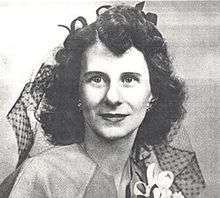Dorothy Yost
| Dorothy Yost | |
|---|---|
 Dorothy Yost as a younger woman | |
| Born |
April 25, 1899 St. Louis, Missouri |
| Died |
June 10, 1967 (aged 68) Monrovia, California |
| Occupation | Screenwriter |
| Years active | 1920-1966 |
Dorothy Yost (April 25, 1899 – June 10, 1967), later married as Dorothy Yost Cummings, was a prominent screenwriter whose career lasted from the silent era well into the sound era. Over her lifetime she worked on more than ninety-four films, including her own screenplays. She was born in St. Louis, Missouri and died in Monrovia, California.[1]
Biography
Before screenwriting, Yost appeared in plays produced by the Scovell Juvenile Stock Company. Yost finished her fourth year of high school before heading to California to begin work for the film industry. In 1917, she was hired as a secretary assisting the scenario editor at Triangle Film Corporation. Just six months after she was hired, she was promoted to the head of reading department where she reviewed and edited scripts.[2]
Yost wrote her first continuity script at the age of twenty-one in 1920. It was an adaptation of For the Soul of Rafael, based on 1906 novel by Marah Ellis Ryan. Soon enough, in 1927, Los Angeles Times praised Dorothy Yost as being Hollywood’s youngest and most successful scenarist.[3]
By 1927, Yost joined the writing staff of the Film Booking Offices of America Pictures, the same year she married her husband, Dwight Cummings. Dwight Cummings was also part of the writing staff and worked with Yost on Fangs of the Wild in 1928.
Her goal
In her writing, Yost included a focus on Hollywood’s representation of ethnic and racial minorities as well as regional settings. Her films taught lessons for life and often highlighted moral principles. Yost held onto a conservative point of view on gender relations, in part because of the societal times but also because of her strict upbringing and involvement with the Unity Church. Aside from her screenplays, Dorothy published her novel, Prodigal Lover. Through her life she accomplished a lot and of the ninety-four works, seventy-seven actually released.[4]
Partial filmography
- Jackie (1921)
- Little Miss Smiles (1922)
- My Husband's Wives (1924)
- Marriage in Transit (1925)
- Kentucky Pride (1925)
- Enemies of Society (1927)
- Little Mickey Grogan (1927)
- The Sea Bat (1930)
- The Gay Divorcee (1934)
- Laddie (1935)
- A Dog of Flanders (1935)
- Alice Adams (1935)
- Freckles (1935)
- Murder on a Bridle Path (1936)
- M'Liss (1936)
- Racing Lady (1937)
- There Goes the Groom (1937)
- The Story of Vernon and Irene Castle (1939)
- Blackmail (1939) (story)
- Blossoms in the Dust (1941) (uncredited)
- Thunderhead, Son of Flicka (1945)
- Smoky (1946)
- The Strawberry Roan (1948)
- Loaded Pistols (1948)
- The Big Cat (1949)
References
- ↑ http://search.ancestrylibrary.com/cgi-bin/sse.dll?db=1940usfedcen&h=71881827&indiv=try&o_vc=Record:OtherRecord&rhSource=6061
- ↑ Boyd, Kathryn Yost. “The House of Yost.” Unpublished family history, ca. 1925.
- ↑ “Scenarist Cites Most Essential Parts of Play.” Los Angeles Times (10 April 1927)
- ↑ Pritchard, Sally. “Contributions of the Yost Family to American Literature.” Unpublished family history, ca. 1958.
External links
- Dorothy Yost on IMDb
- Dorothy Yost at the Women Film Pioneers Project